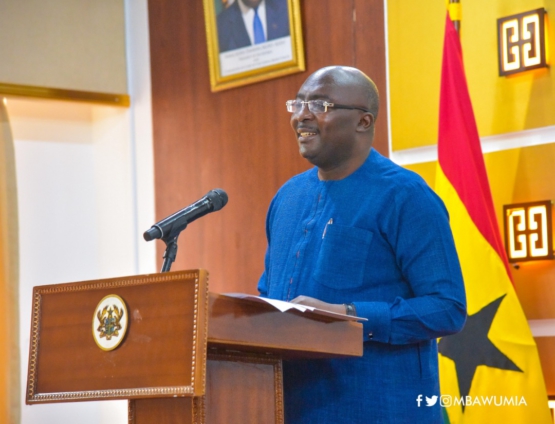Vice President Mahamudu Bawumia says Ghana is prepared for the digitalised economy which would be the new global norm after the Covid-19 pandemic.
Speaking at the launch of the Microfinance and Small Loans Centre (MASLOC’s) Integrated ICT System, Dr Bawumia indicated that the current global health crisis has awakened many nations to the importance of digitalisation.
However, he said Ghana will not be left out since President Akufo-Addo has aggressively pursued digitalisation of government operations and every aspect of the economy when he assumed office in January 2017.

“Covid-19 has been destructive in many ways of our lives but destructive events can catalyze change for the better, we are witnessing an awakening of a new world order which will be an increase reliance and confidence in technology.
“Thankfully Ghana is already on course as far as digitalization is concerned,” he said.

MASLOC's integrated ICT system is a new innovation which will automate all the operations of microfinance companies to improve efficiency in the institution.
The platform which is a collaboration between the centre, the ARP Apex bank and designed by the Eban Capital, the software providers automates end to end process of credit management, loan application, credit assessment, disbursement of loan, loan repayment and monitoring and reporting all to make loan assessable.
Addressing officials of the MASLOC, Dr Bawumia said the initiative is a technological solution that would address payment and settlement challenges of MASLOC and make it business friendly to its customers.
He further commended the leadership of MASLOC for the initiative since it is in line with President Nana Akufo-Addo’s vision of a digitalised economy and formalize the informal sector as well.
“With this Integrated ICT system, MASLOC is poised to effectively deliver on its objective of providing funds to SMEs especially the unbanked customers who form a greater percentage of the informal sector of the economy.
“And the organisation will also position itself for the next world order of service delivery.”

Finance minister Ken Ofori Atta speaking about the effect of the pandemic on the economy, revealed that the lockdown was not extended because a chunk of the Ghanaian population operate within the informal sector; the hardest hit sector during the restriction.
It therefore became "increasingly impossible to continue" with the lockdown directive he added.
Latest Stories
-
Asantehene receives more 19th century gold ornament and regalia
7 mins -
Hohoe Ghana Blind Union organises training for members ahead of Election 2024
13 mins -
Alan Kyerematen reveals his future plans for Ghanaian Health professionals
14 mins -
AAIN empowers women and small enterprises in Upper East Region through SHINE project
15 mins -
Akufo-Addo leads nationwide commissioning of 80 educational projects
22 mins -
Ghana and Seychelles strengthen bilateral ties with focus on key sectors
53 mins -
National Elections Security Taskforce meets political party heads ahead of December elections
56 mins -
Samsung’s AI-powered innovations honored by Consumer Technology Association
1 hour -
Fugitive Zambian MP arrested in Zimbabwe – minister
2 hours -
Town council in Canada at standstill over refusal to take King’s oath
2 hours -
Trump picks Pam Bondi as attorney general after Matt Gaetz withdraws
2 hours -
Providing quality seeds to farmers is first step towards achieving food security in Ghana
2 hours -
Thousands of PayPal customers report brief outage
2 hours -
Gary Gensler to leave role as SEC chairman
2 hours -
Contraceptive pills recalled in South Africa after mix-up
3 hours

